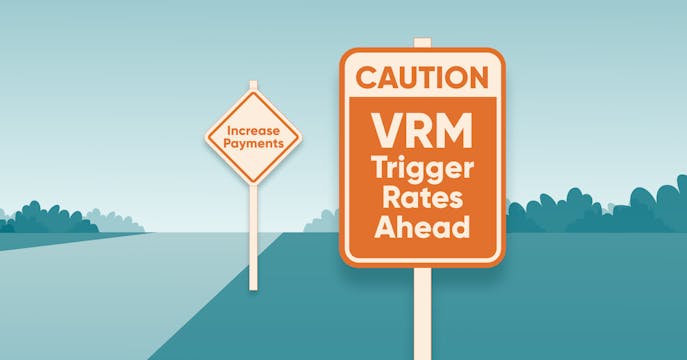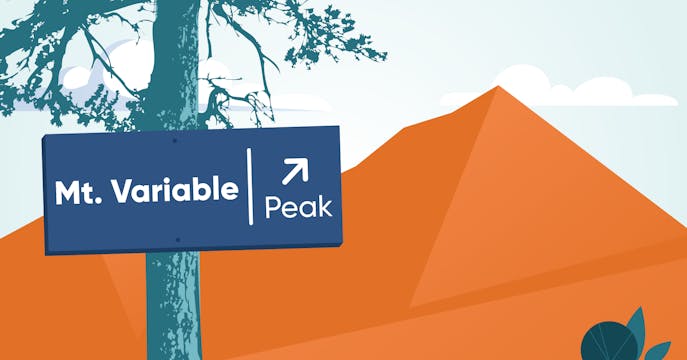Lowest Mortgage Rate in Canada. Starting from 2.49%
What is an Adjustable-Rate Mortgage?
This type of variable-rate mortgage, called an ARM, has payments that adjust with movements in the prime rate.
It's not the same as a VRM product offered by some big banks which have fixed payments despite a variable rate. Learn the important differences between these two variable types — and why one may end up costing you a lot more.
Updated from August 25, 2022
Are you a THINK Financial client? Then you have an ARM with floating payments. A VRM with fixed payments are offered by some big banks.
The ARM vs the VRM
Some homeowners choose a variable rate despite the risk of change to potentially save more over (typically) higher fixed rates. But the payment type you choose can impact that overall savings advantage.
There are two types of variable-rate mortgages:
- An Adjustable-Rate Mortgage (ARM) has a floating payment amount that rises and falls with changes in the prime rate. If the rate moves, the payment change usually happens at the end of a full payment period (usually the payment after the upcoming one).
- A Variable-Rate Mortgage (VRM) has fixed payments like a fixed-rate mortgage, but the interest portion rises and falls with changes in prime, pushing the 'principal' portion up or down to affect the amortization. This product includes a trigger rate, which if reached, means that the payment no longer covers the interest portion.
The main differences between the ARM vs the VRM product:
| Adjustable-Rate Mortgage (ARM) | Variable-Rate Mortgage (VRM) | |
|---|---|---|
| Payment Amount Changes with Prime | Yes | No |
| Interest and Principal | Interest amount changes, principal amount paid stays on track | Within payment amount, interest goes up or down affecting amount going to principal |
| Mortgage Length (Amortization) | Unaffected by interest changes | Gets longer or shorter depending on the amounts going to principal |
| Comes with a Trigger Rate/Point | No | Yes; if hit, mortgage length and balance can increase faster |
| Renewal Risk?* | No. Mortgage length and balance on track to be paid off as scheduled | Yes. If mortgage length and balance have increased, you'll pay a much higher payment (or a lump sum) |
| HOW YOU SAVE MORE** | If rates go up, mortgage length and balance stay on track to NOT cost you more; if rates go down, you'll have extra monthly budget room | If rates go down, more will go to your principal to pay off your mortgage faster |
| THE POTENTIAL COST | If rates go up, increasing payments may strain your budget capacity | If rates go up, you may experience 'payment shock' at renewal plus pay MORE interest if your mortgage length or balance has increased |
| *Not including current rate offered by lender | ||
| **Beyond any variable-rate advantage |
Can the VRM derail your mortgage goals?
The VRM product provides budget certainty through fixed payments. But if rates go up and stay up during your term, you may be in for 'payment shock' when it's time to renew.
The higher the rate goes, the more interest you pay, with less going towards your principal. That lengthens your amortization, which can quickly tick upwards to beyond your original time — called a negative amortization.
If rates rise enough to hit and surpass your trigger rate and trigger point, both your amortization and mortgage balance will continue to increase. The lender will likely contact you to raise your payment or pay a lump sum well before your renewal, but it may not be enough to stop your amortization from increasing.
So, the risk of a VRM is the potential for the fixed payments to derail your mortgage budget and goals, by forcing you into much higher payments than expected at (or before) renewal. You'll also pay more interest overall, likely negating any variable-interest savings you were hoping for in the first place.
There is a flip side to this risk. If rates go down enough during your term, more of your payment will go towards your principal, which may help balance out previous increases or continue their pace to pay off your mortgage sooner.
The ARM may offer better long-term savings
Many in the mortgage industry, including True North Mortgage CEO Dan Eisner, feel that the ARM's floating payment is a better choice IF you can handle the potential for increasing payments.
That's why it's the only variable-rate product offered by our in-house lender, THINK Financial. Dan looks at the bigger (mortgage) picture: "When rates go up, your payments are increasing gradually, allowing some time to adjust, versus the potential 'big payment shock' that may await you at renewal time with the VRM product." He adds, "Plus, you're more likely to keep your variable-rate savings intact, without the risk of increasing your interest costs through the fixed-payment vehicle."
Variable rates offer lower penalties to break.
Compared to a fixed-rate product, both the ARM and VRM also offer significantly lower penalties for switching to a different product or lender (3 months interest vs IRD calculations), which is sometimes the deciding factor that tips a homeowner into a variable-rate product.
Why adjusting payments are better for your budget if variable rates go down.
If and when rates do finally start to drop, your payments will adjust down with each drop for lower mortgage payment and some welcome budget relief."
With a VRM, you likely won't be able to change your payment amount with the lender — and if you have a negative amortization by the time you renew, you'll hit higher payments even if rates have dropped.
Have questions about your variable rate product?
It's important to know which type of variable product you have, or which one is the right choice for you. We have access to several lenders AND products, including those offered through our own lender, THINK Financial. Talk to us today if you have questions!
We're always here to run the numbers for you and provide options if you'd like a change, or if you need more ideas on how to save on your mortgage.
At True North Mortgage, our highly trained brokers have the tools and experience to help you make the right choice for your budget. Give us a shout anywhere you are in Canada — for 5-star mortgage advice.
Get the advice you need to sleep at night.
We really know mortgages, here's more

Have you hit your trigger rate?
If your variable rate has fixed payments, here's how to avoid (mortgage) trouble ahead.

Proof that our rates are lower.
Our rates are 0.18% lower on average compared to everyone else. Prove it? Okay!

Have variable rates peaked?
After an arduous rate rise — are there savings to snag on the climb down?

